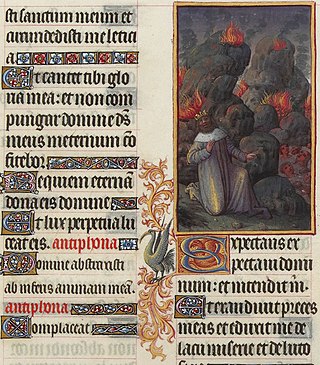Top Qs
Timeline
Chat
Perspective
Psalm 40
Biblical psalm From Wikipedia, the free encyclopedia
Remove ads
Psalm 40 is the 40th psalm of the Book of Psalms, beginning in English in the King James Version: "I waited patiently for the LORD". The Book of Psalms is part of the third section of the Hebrew Bible, and a book of the Christian Old Testament. In the slightly different numbering system used in the Greek Septuagint and Latin Vulgate translations of the Bible, this psalm is Psalm 39. In Latin, it is known by the incipit, "Expectans expectavi Dominum".[1] It is described by the Jerusalem Bible as a "song of praise and prayer for help".[2]
Psalm 40 is used in both Jewish and Christian liturgies. It has been set to music, Baroque settings and U2's song "40" from their 1983 album, War. Two composers used the beginning for symphonic compositions, Mendelssohn's Lobgesang and Stravinsky's Symphony of Psalms.
Remove ads
Structure
The first part of the Psalm (verses 1-11) is one in the series of psalms of thanksgiving of an individual. Verses 13-18, possibly set originally in an independent Psalm context, are virtually identical to Psalm 70. This part belongs more in the group of psalms of lament. Matthew Henry divides the psalm into three sections:
- Confidence for deliverance (verses 1-5)
- Christ's work of redemption (6-10)
- A prayer for mercy and grace (11-17).[3]
Remove ads
Interpretation
Some writers see verses 6-9 as prophetic of Jesus,[4][5] or of the messiah generally.[6]
John Wesley saw it as a prayer of salvation.[clarification needed][7]
Uses
Summarize
Perspective

New Testament
Verses 6-8 are quoted in Hebrews 10:5–7.[8]
This phrase "I delight to do your will" is also contrasted with the verse in the same Psalm where "They delight to do me harm". This adds to this imagery portending the plots against and betrayal of Jesus. The following Psalm 41 is also seen by the New Testament to portend the betrayal of Jesus by Judas.
Judaism
- Verse 2 is found in the repetition of the Amidah during Rosh Hashanah.[9]
- Verse 12 is the second verse from V'hu Rachum in Pesukei Dezimra,[10] and the long Tachanun recited on Mondays and Thursdays.[11]
Book of Common Prayer
In the Church of England's Book of Common Prayer, this psalm is appointed to be read on the morning of the eighth day of the month,[12] as well as at Matins on Good Friday.[13]
Music
Heinrich Schütz wrote a setting of a paraphrase of Psalm 40 in German, "Ich harrete des Herren", SWV 137, for the Becker Psalter, published first in 1628. Mendelssohn used the beginning in German as the text for the fifth movement from his Lobgesang. The same verses in Latin form the text of the second movement of Stravinsky's Symphony of Psalms.
The Psalm was used in U2's song "40", the final track from their 1983 album, War.
A song by The Mountain Goats titled "Psalm 40:2" appears on their 2009 album The Life of the World to Come, inspired by this verse.[14]
Text
Summarize
Perspective
The following table shows the Hebrew text[15][16] of the Psalm with vowels, alongside the Koine Greek text in the Septuagint[17] and the English translation from the King James Version. Note that the meaning can slightly differ between these versions, as the Septuagint and the Masoretic Text come from different textual traditions.[note 1] In the Septuagint, this psalm is numbered Psalm 39.
Remove ads
Notes
- A 1917 translation directly from Hebrew to English by the Jewish Publication Society can be found here or here, and an 1844 translation directly from the Septuagint by L. C. L. Brenton can be found here. Both translations are in the public domain.
- In the Jewish verse numbering, the ascription of this psalm is verse 1, and the rest of the psalm begins from verse 2. However, the Christian verse numbering does not count the ascription as a separate verse.
Remove ads
References
External links
Wikiwand - on
Seamless Wikipedia browsing. On steroids.
Remove ads

